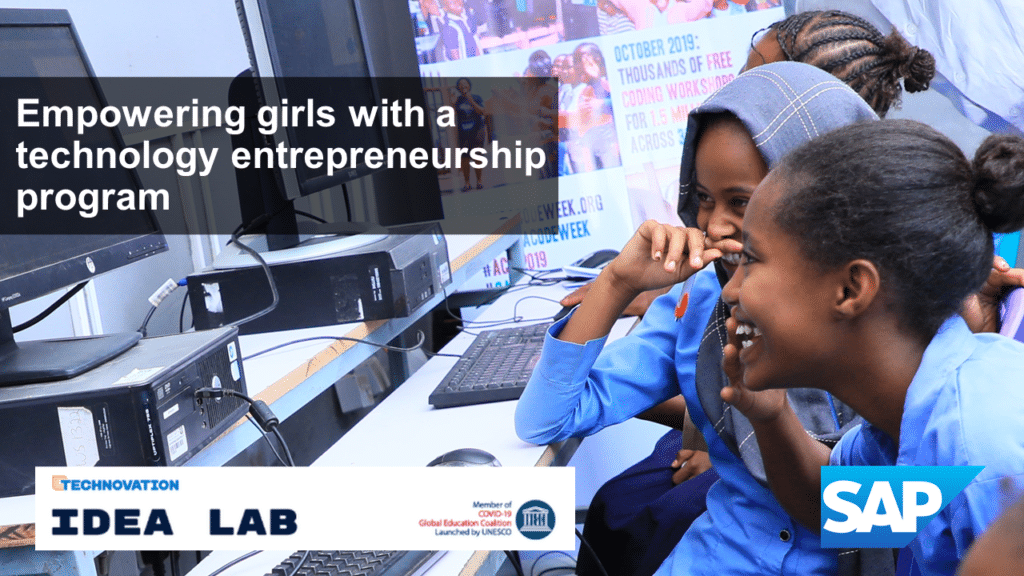45 SAP experts volunteered all summer to mentor girls in the Technovation Idea Lab
- Did you know that the first programmer was a woman? Two centuries later, Ada Lovelace would probably find hard to believe that globally, women only hold 24% of jobs in the ICT sector.
- Celebrated on the second Tuesday of October since 2009, Ada Lovelace Day aims to raise the profile of women in science, technology, engineering, and maths (STEM), and to ‘create new role models for girls and women’.
- As COVID-19 creates additional barriers to learning, and digital skills are ever more important, UNESCO and Technovation have partnered to empower girls to ‘tech’ the stage.
Project-Based Learning Goes Global…and Virtual
 The late Seymour Papert, father of the Scratch coding learning platform and a global pioneer in project-based learning, once described the future of education as follows: “Kids will work in communities of common interest on rich projects that will connect with powerful ideas[i].” According to him, not only do children learn better when engaged in a project, but they are able to use technology and inquiry to respond to a complex issue, problem or challenge.
The late Seymour Papert, father of the Scratch coding learning platform and a global pioneer in project-based learning, once described the future of education as follows: “Kids will work in communities of common interest on rich projects that will connect with powerful ideas[i].” According to him, not only do children learn better when engaged in a project, but they are able to use technology and inquiry to respond to a complex issue, problem or challenge.
This is exactly what 1,359 girls from all corners of the world were able to partake in: a global challenge where they could build an Artificial Intelligence (AI) solution that solves a community issue close to their heart, tech entrepreneur style.
As accessible and virtual learning for girls becomes more important than ever before, UNESCO has partnered with global tech education non-profit Technovation, a member of UNESCO’s Global Education Coalition, to support countries in developing inclusive learning solutions. Together they ran the Technovation Idea Lab: an online tech education challenge for girls.
‘Empower a Woman, Empower a Nation’
Joined by community partners and local industry mentors (including 45 ICT experts from 6 SAP offices in Brazil, France, India, Ireland, Mexico and South Africa), adolescent girls (aged 10-18) from Brazil, India, Kenya, Mexico, Nigeria, Pakistan went through an exciting learning journey.
The challenge started on July 27 with a 5-week AI entrepreneurship learning program: a great way to inspire girls through tech in an immersive, hands-on environment that enables them to solve the real-world challenges they care about most. Collaborative problem-solving, ethics in AI models, dataset building, ideation: these are just a sample of the skillset that the girls were able to hone along the way.
SAP volunteers provided feedback on students’ work, held virtual office hours, and helped create videos and blog posts to help inspire and engage girls around AI learning and its application to real-world problems. SAP volunteers treasured this unique opportunity to share their expertise with the next generation of female innovators and leaders.
“Encouraging girls to innovate at an early age is a great way to ignite their social changemaker mindset,” says Claire Gillissen-Duval, Director of EMEA Corporate Social Responsibility and co-founder of the Africa Code Week initiative at SAP. “With the continent’s working-age population expected to swell by two-thirds reaching 600 million by 2030[ii], the community-oriented and highly creative African girls have a pivotal role to play in building a safer and more equitable future”.
As nations strive to ensure continuity of learning through alternative methods such as online learning, the focus must be maintained on major threats to development such as the gender digital divide. And we shall all keep in mind, as UN former Secretary-General Kofi Annan once said, that “when women thrive, all of society benefits and succeeding generations are given a better start in life. The empowerment of women is the most effective tool for development[iii].”
[i] Edutopia – Seymour Papert: Project-Based Learning
[ii] World Economic Forum – The Future of Jobs and Skills in Africa (2017)
[iii] United Nations – Kofi Annan speech commemorating women’s day – 7 March 2003



